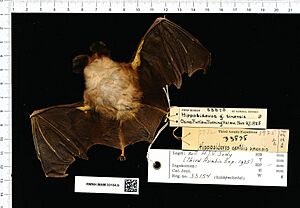Pomona roundleaf bat facts for kids
Quick facts for kids Pomona roundleaf bat |
|
|---|---|
 |
|
| Conservation status | |
| Scientific classification |
|
| Kingdom: | Animalia |
| Phylum: | Chordata |
| Class: | Mammalia |
| Order: | Chiroptera |
| Family: | Hipposideridae |
| Genus: | Hipposideros |
| Species: |
H. pomona
|
| Binomial name | |
| Hipposideros pomona Andersen, 1918
|
|
| Script error: The function "autoWithCaption" does not exist. | |
Script error: No such module "Check for conflicting parameters".
The Pomona roundleaf bat is a special kind of bat. It's also known as the Pomona leaf-nosed bat or Andersen's leaf-nosed bat. Its scientific name is Hipposideros pomona. This bat lives only in India. It belongs to a bat family called Hipposideridae.
About the Pomona Roundleaf Bat
A scientist named Knud Andersen first described this bat in 1918. He was from Denmark. The very first bat of this type, called a holotype (a special example specimen), was found in India. It was collected by G. C. Shortridge in an area then known as Coorg Province.
For a while, another bat called the Vietnam leaf-nosed bat (Paracoelops megalotis) was thought to be a different species. But in 2012, scientists looked closely at it. They found that it was actually the same as the Pomona roundleaf bat. Their skulls and teeth were exactly alike. So, now they are considered the same species.
What Does It Look Like?
The Pomona roundleaf bat is a small bat. Its forearm, which is part of its wing, is about 39 to 43 millimeters (about 1.5 to 1.7 inches) long.
Where Can You Find It?
The Pomona roundleaf bat lives only in India. Some scientists think another bat, H. gentilis, is a separate species. If that's true, then the Pomona roundleaf bat lives in a very small area. It can only be found in about 8 to 10 roosts. These roosts are in an area of just 32 to 40 square kilometers (about 12 to 15 square miles).
Because it lives in such a small area, this bat is in danger. As of 2020, it is listed as an endangered species by the IUCN. This means there are not many of them left, and they need protection.
 | Delilah Pierce |
 | Gordon Parks |
 | Augusta Savage |
 | Charles Ethan Porter |


